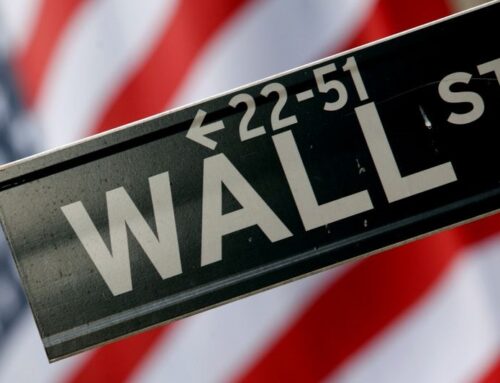U.S. Stocks Climb as Oil Gains, Pfizer Rises...
February 5, 2015
Don’t Miss Out — Follow us on: Facebook Twitter Instagram Youtube
by Oliver RenickAlan Soughley
1:54 AM PST
February 5, 2015
(Bloomberg) — U.S. stocks climbed, with benchmark indexes trading near break-even levels for the year, as oil resumed a rebound and Pfizer Inc. announced a $17 billion deal.
Denbury Resources Inc. and Noble Corp. jumped more than 3.4 percent as oil climbed 4.5 percent. Pfizer added 2.4 percent as it agreed to buy Hospira Inc., the biggest provider of injectable drugs and infusion technology. Hospira jumped 35 percent.
The Standard & Poor’s 500 Index added 0.8 percent to 2,058.19 at 3:17 p.m. in New York. The Dow Jones Industrial Average rose 165.95 points, or 0.9 percent, to 17,838.97, wiping out its 2015 drop. Trading in S&P 500 companies was 9 percent above the 30-day average.
“Right now it’s earnings, Greece and M&A,” Krishna Memani, the New York-based chief investment officer at Oppenheimer Funds Inc., said by phone. “It’s more about the corporate outlook in the U.S. remaining good and the realization that while the Greek issue is important, it will eventually be resolved.”
The S&P 500 fell 0.4 percent yesterday, following the biggest two-day rally in almost a month, as stocks gave up gains in the final 30 minutes after the European Central Bank tightened its rules on lending to Greek banks and oil retreated.
Earnings Season
The benchmark gauge in January posted its worst month in a year amid concern that slowing growth overseas will hurt the U.S. economy, while tumbling crude oil and the strengthening dollar weighed on earnings at multinational corporations.
U.S. crude prices gained more than 6 percent Thursday, after plunging 8.7 percent Wednesday, the most since November. Oil’s swings have intensified since the Organization of Petroleum Exporting Countries decided in November not to cut output amid a global surplus. The Chicago Board Options Exchange Crude Oil Volatility Index, which measures price fluctuations using options of the U.S. Oil Fund, ended Wednesday at the highest since April 2009.
Oil’s wide swings have rippled through equity markets. The CBOE Volatility Index fell 5.7 percent to 17.28 after rising 5.8 percent Wednesday. The gauge, known as the VIX, is down 18 percent this week after jumping 26 percent last week.
A Goldman Sachs Group Inc. gauge of the most-shorted stocks in the Russell 3000 Index jumped 2.4 percent Thursday, bringing its rally since the end of January to 5.9 percent. The S&P 500 has advanced 3.2 percent in that period.
News Corp., Symantec Corp. and Philip Morris International Inc. are among 28 companies reporting quarterly results today. About 78 percent of S&P 500 members that have posted results this season have beaten analyst estimates, while 55 percent have topped sales projections, data compiled by Bloomberg show.
Jobs Data
Data on Thursday showed fewer Americans than forecast filed jobless claims last week. Applications for unemployment benefits increased by 11,000 to 278,000 in the week ended Jan. 31, from a revised 267,000 in the prior period. The median forecast of 50 economists surveyed by Bloomberg called for a rise to 290,000.
Friday’s jobs report from the Labor Department is predicted to show nonfarm payrolls rose by 230,000 last month, while the unemployment rate remained at 5.6 percent.
A separate report showed the U.S. trade deficit increased unexpectedly in December to a two-year high on a pickup in imports of motor vehicles and fewer shipments overseas. Companies imported a record $48.8 billion in consumer goods along with more industrial supplies and capital equipment, showing U.S. demand is holding up as global economies cool.
Progress toward reducing the trade gap will probably be difficult because of slower demand from overseas markets and a rally in the U.S. dollar.
Pfizer Deal
“Obviously Europe matters but what’s a little more important is what’s happening domestically,” Jerry Villella, a global investment specialist at JP Morgan Private Bank in Dallas, said by phone. “We’re about halfway through earnings season and with the exception of energy and financials, it’s been mostly a good story.”
Materials, health-care and energy companies led as all 10 of the S&P 500’s industry groups rose.
Pfizer rose to its highest level since December and Hospira climbed to a record. Pfizer has been looking to make an acquisition after a failed $120 billion bid for AstraZeneca Plc last year in what would have been the industry’s biggest-ever takeover. Buying Hospira will add a broad range of generic sterile injectable medicines to Pfizer’s portfolio and assist the company’s strategy to offer more biosimilar drugs.
Ball Corp. saw its biggest gain since 2011, adding 8.6 percent and reaching a record high, after Rexam Plc confirmed talks about a possible sale to its U.S. competitor that may value the U.K. beverage-can manufacturer at about $6.6 billion.
‘Feeling Comfortable’
“Good companies are feeling comfortable enough that they want to merge and the market is generally positive toward that, but there’s always the question of if they are merging because they can’t grow their top line organically,” Frank Ingarra, head trader at Greenwich, Connecticut-based NorthCoast Asset Management LLC, said by phone.
Twitter Inc. climbed 1.3 percent as people with knowledge of the matter said it struck a deal with Google Inc. to facilitate easier online searches for its 140-character updates.
Visa Inc. added 1.9 percent to $269.95, and earlier at the highest since 2008. The shares have rallied 9.5 percent in six sessions, the most since November, after announcing last week better-than-forecast earnings and a stock split.
Frontier Communications Corp. advanced 4.9 percent as people familiar with the situation said it may buy $10 billion in landline assets from Verizon Communications Inc. as early as this week.
Keurig Green Mountain Inc. slid 4.6 percent after cutting its 2015 profit outlook. The company cited slower-than-expected sales of a new coffee brewer.
Michael Kors Holdings Ltd. fell 2.7 percent after North American sales missed estimates, raising concern that the maker of luxury goods is suffering a slowdown in its biggest market.
Airline stocks declined, on pace for the fourth loss in five sessions, as oil prices gained. United Continental Holdings Inc. and American Airlines Group Inc. lost at least 1.4 percent as nine of 11 companies in a Bloomberg index of airlines fell.
To contact the reporters on this story: Oliver Renick in New York at orenick2@bloomberg.net; Alan Soughley in Frankfurt at asoughley@bloomberg.net
To contact the editors responsible for this story: Jeff Sutherland at jsutherlan13@bloomberg.net John Shipman, Namitha Jagadeesh
Stocks Oil Markets Earnings S&P 500 New York Crude Oil Volatility Index Drugs Jobs
Search
RECENT PRESS RELEASES
Related Post




